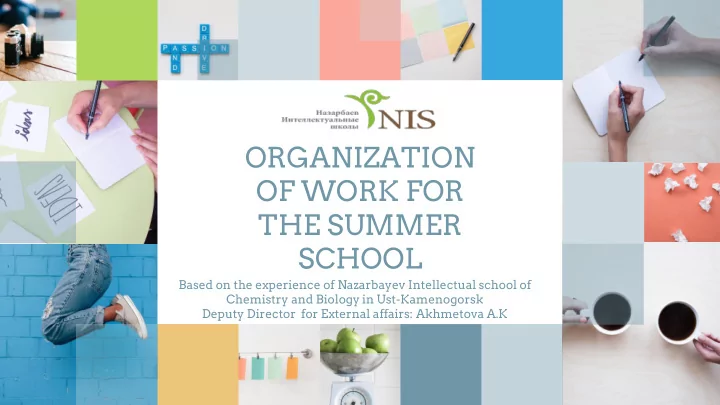

ORGANIZATION OF WORK FOR THE SUMMER SCHOOL Based on the experience of Nazarbayev Intellectual school of Chemistry and Biology in Ust-Kamenogorsk Deputy Director for External affairs: Akhmetova A.K
Conte tent: I I Su Summer Sc School l fo for r Nazarbayev In Inte telle lectual l sch chool l (N (NIS) stu tudents a) General information on the organization of the Summer school; b) Conclusions and recommendations. II II Su Summer r Sc School fo for r secondary sch chool l (S (SS) students a) General information on the organization of the Summer School; b) Student enrollment; c) Conclusions and recommendations.
Summer school for NIS students 30.05.2016-10.06.2016
Summer school courses № “Science” Summer school courses: No of No of sub- students groups 31 2 1 Biotechnology and Bioengineering 30 2 2 Pharmakon 30 2 3 Engineering 31 2 4 Soil and its unique properties 11 1 5 Robotics 16 1 6 Science Sparks 30 2 7 Soap design and production 32 2 8 Eco-house Total number of students* 211 • Chinese language (15 students) • German language (10 students) Additional • French language (11 students) courses: • Design thinking and critical thinking (30 students) • Olympiad school (74 students) 1 • Additional courses for students who were falling behind (30 students)
Daily schedule Time Event 9.40-10.00 Breakfast 10.00-11.50 Courses 12.00-12.40 Practical works/ Preparation for scientific competition 12.40-13.00 Lunch 13.00-13.10 Award nominations 13.10-14.00 Extracurricular activities and clubs ■ “ Vocal ” club ■ Sport sections : ■ Football ■ “ Dance ” club Extracurricular ■ “ Guitar ” club ■ Volleyball activities and clubs : ■ “ Dombyra ” club ■ Tennis ■ Improvisation theatre ■ Basketball ■ “ Chess ” club ■ Fitness
General conclusions and recommendations • To provide schools with an access to the system to adjust number of Web-site places on a course and remove/alter course participants • To include only available resources to the summer school program (as well as listing alternative resources); Programmes/re • To conduct courses for each parallel sources separately; • To offer students two courses in two weeks. • We should mainly rely on Teachers international teachers and local English teachers.
Summer school for secondary school students 13.06.2016-24.06.2016
The number of participants in the courses № Course No of students 1 18 The soil and its unique properties / Biotechnology and Bioengineering (free of charge) 2 25 Engineering / Manufacturing and design of soap (free of charge) 3 English (fee based) 14 Total number of students for free of charge courses 43 Total number of students for fee based courses 14 Number of students from secondary schools of the region 25 20 15 10 5 0
Daily schedule Time Event 9.00-9.40 Courses 9.40-10.00 Flashmob/games 10.00-10.50 Courses 11.00-12.00 Extracurricular activities/clubs (dance, sport games)* Participants of free of charge courses finish lessons 12.00-12.30 Lunch 12.30-13.10 Courses 13.20-14.10 Courses 1 week 2 week Group 1 Soil and its unique Biotechnology and (2 subgroups) properties Bioengineering Goup 2 Engineering Soap design and (2 subgroups) production
Events during Summer school Day themes/Events Day of conduction “Blue” day 14.06 Day of a creative T-shirt 16.06 “ Easy Science ” Competition 17.06 с 11.00 до 12.00 “White” day 20.06 Day of a Creative Hat/Cap 22.06 “ Easy Science ” Competition/ 24.06 Summer School closure From 11.00 to 12.00
Student enrolment For student enrollment for summer school courses the school has implemented the following steps: ■ Advertisements were posted in regional newspapers; ■ Information leaflets were sent out to social networks; ■ Advertisements were announced on street radio (shopping centers, bus stops); ■ Information letters were sent to the regional Education Department, urban and rural schools; ■ Information letters were sent to parents, the first leaders of large organizations; ■ Visits to schools were made, individual interviews with headmasters were conducted, promotional flyers were distributed to directors, teachers and students; ■ Promotional flyers were displayed at the entrances of houses, schools and bus stops.
Conclusions and recommendations ■ To start advertising on the courses offered at least two months before the start of the course. ■ To simplify the process of registration and payment for the course. ■ Instead of 50 hours of paid courses to offer 25 hours or less per a course. ■ To customize the program according to learners 'basic knowledge and language level. ■ To focus on English and Robotics courses. ■ Robotics should be conducted for grades 1-4 students. ■ To organize fee-based IELTS courses for students and adults. ■ To organize fee-based courses for 5 th and 7 th grade students.
THANK YOU FOR YOUR ATTENTION! ■ E-mail: akhmetova_a@ukk.nis.edu.kz ■ Internal phone: 6112
Recommend
More recommend